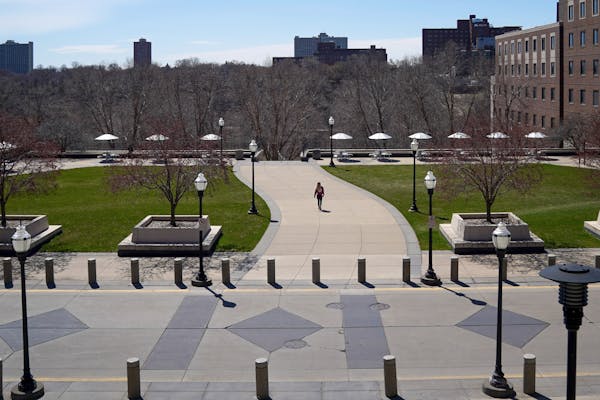The University of Minnesota's Twin Cities campus is among five institutions across the country under a new investigation by the federal Department of Education for antisemitism.
In response, University of Minnesota officials said Tuesday they're "confident" in their approach to combating hate and bias on campus, a spokesperson said in a statement. U officials are reviewing information about the federal investigation and will cooperate fully, they said.
"The University continues to stand firmly against antisemitism," the statement said. "We have and will continue to respond promptly and fully to any reports of harassment, intimidation, or bias against Jewish students — or any other members of our University community — in accordance with our University values, our own policies, and our responsibility under the law."
The scrutiny comes after a U law professor and former regent last winter filed a complaint about antisemitism in the U's College of Liberal Arts. According to the Department of Education's website, the investigation is still open.
The Department of Education said Monday that officials were also probing allegations of antisemitism at Columbia University, Northwestern University, Portland State University and the University of California, Berkeley. At least three of the five institutions, including the U, have open investigations at the Department of Education related to discrimination in recent years.
Emily Boskoff, executive director of Minnesota Hillel, a Jewish student organization at the U, said the campus must be safe and welcoming for all students.
"We hope this investigation, along with other initiatives already underway ... will continue to improve the campus climate for Jewish Gophers," she said.
The whole campus community, including administration, "has a critical role to play in countering antisemitism and all forms of hate," Boskoff added.
The new investigations by the department's Office for Civil Rights, "are in response to the explosion of antisemitism on American campuses following the Hamas massacre of Israeli civilians on Oct. 7, 2023," the Department of Education wrote in a statement.
"Too many universities have tolerated widespread antisemitic harassment and the illegal encampments that paralyzed campus life last year, driving Jewish life and religious expression underground," Craig Trainor, acting assistant secretary for civil rights, said in the release.
The department is putting K-12 schools, colleges and universities "on notice" that the Trump administration won't tolerate "continued institutional indifference" to the well-being of Jewish students, the statement read. The new investigations will build on work by the House Committee on Education and the Workforce that concluded that university administrations "overwhelmingly failed" to protect and support Jewish students and made concessions to protesters' encampments.
The investigations are among several actions the Trump administration has taken recently related to antisemitism. On Monday, the Justice Department announced it was forming a task force to address the issue.
Last week, President Donald Trump signed an executive order seeking to fight antisemitism on college campuses and vowing action against Hamas sympathizers among student groups. He also said he would deport any "resident aliens" who participated in the pro-Palestinian protests.
Complaint filed last winter
The complaint filed last winter by U law professor Richard Painter and Michael Hsu, a former U regent, raised concerns about the U's decision to let some faculty members post pro-Palestinian statements on an official university website.
Five incidents were included as possibilities for investigation, some predating the Oct. 7, 2023, attack by Hamas on Israel.
The Department of Education had said previously it would "take aggressive action" to combat what it called an "alarming nationwide rise" in reports of both antisemitism and Islamophobia since the latest conflict between Israel and Hamas.
A month later, the department said it would investigate whether discrimination occurred in response to the complaint from Painter and Hsu. Hsu said it's not clear to him whether the latest investigation is continuing to look into past complaints — like the one he filed — or new ones.
Hsu said he and Painter recently contacted U officials to see if their complaint might be resolved through a resolution or other agreement before Trump took office. In an email provided to the Minnesota Star Tribune, University of Minnesota President Rebecca Cunningham told Painter in December that the U takes such complaints seriously and has provided all the information the Office for Civil Rights has sought in investigating Hsu and Painter's complaint.
She said the U is working through a university process that gives faculty a role in making decisions on campus.
"We warned [the U] and they didn't do anything," Hsu said. "We're happy to see the new administration is taking this seriously ... because this has been dragging on for way too long and needs attention."
"There's no room for antisemitism on campuses," he added.
'National crisis' of growing antisemitism
Sami Rahamim, spokesperson for the Jewish Community Relations Council of Minnesota and the Dakotas, said his organization welcomes the decision to investigate antisemitism on the U's campus.
He said the council appreciates steps Cunningham has taken to enforce U policies, including calling out pro-Palestinian protesters who barricaded Morrill Hall last fall as unacceptable and participating in a Hillel International initiative to counter antisemitism at colleges. But, he said, "significant work remains to restore confidence among Jewish students, faculty and staff."
He noted the spring encampments by pro-Palestinian protesters and the Morrill Hall protest are both part of a "surge of pro-Hamas demonstrations, featuring slogans glorifying the Oct. 7 massacre and Hamas terrorists, alongside calls for the destruction of America and Israel."
He said antisemitism at the U is part of a larger "national crisis," with a vast majority of Jewish American students experiencing or witnessing antisemitism since Oct. 7, 2023, according to a fall 2024 survey.
Rahamim said the council will continue to partner with other Jewish organizations to ensure the U is a "welcoming place" for Jewish students, faculty and staff.

A history buff's quest to mark St. Paul's 'pillbox' ballpark
Prostate experts see familiar scenario in Biden's cancer diagnosis

Pushback leads Minneapolis schools to restore some funding for Latino, but not Black, student programs

Live podcast event to draw line between Minneapolis of almost 100 years ago, events of 2020

